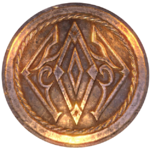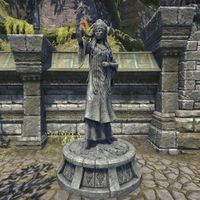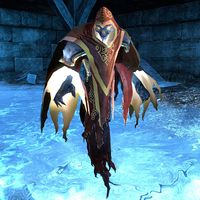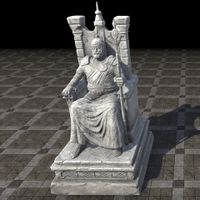Lore:Alessian Empire
| Alessian Empire | |||
|---|---|---|---|
 |
|||
| 1E 243 – Late First Era | |||
| Capital | Imperial City | ||
| Location | Cyrodiil, Skyrim, High Rock | ||
| Common languages | Cyrodilic | ||
| Religions | |||
| Government | Absolute monarchy (1E 243 - 1E 361) Theocratic absolute monarchy (1E 361 - 1E 2331) Puppet state of Skingrad (1E 2331) |
||
| Preceded By | Succeeded By | ||
The Alessian Empire, also called the First Empire,[1] the Empire of Cyrodiil,[2][3] and the Empire of Men,[4] was established by the former Nede slaves of the Ayleid Empire in 1E 243 following the Alessian Slave Rebellion.[5] The Empire traces its founding to the moment when Saint Alessia received the Dragonfires and the Amulet of Kings from Akatosh; she used the Amulet to drive the Daedra out of the mortal realm.[6] Their empire would last for over two thousand years. Akatosh told Alessia that as long as the Dragonfires remained lit and her heirs wore the Amulet of Kings, the gates of Oblivion would remain shut and Tamriel would be spared the depredations of the Daedra.[6]
Only a few rulers of the First Empire are now known: Queen Alessia, its founder and spiritual leader; Belharza the Man-Bull, Alessia's heir by her consort Morihaus, crowned in 1E 266; Gorieus, crowned in 1E 461; and Hestra, who expanded the reaches of the Empire all the way to High Rock in 1E 1029.[7] One of the defining events of the Empire was the rise of the zealously monotheistic Alessian Order, which followed the teachings of the prophet Marukh.[8] The Order's influence spread rapidly until, in 1E 361, its puritanical doctrines were formally adopted and enforced by the Empire.[9] Thereafter, the arch-prelates of the Order were said to wield almost as much power as the emperors themselves.[10] It was a sect of the Order called the Marukhati Selective that was responsible for the Dragon Break known as the "Middle Dawn".[11][12]
The Alessian Empire's territory fluctuated considerably throughout its history. At its inception it encompassed East Cyrodiil, including the Nibenay Valley and the White-Gold Tower, which later became the centerpiece of the Imperial City; West Cyrodiil remained a patchwork of independent Colovian kingdoms that resisted the Alessian Order's dogma.[8][13] A number of Ayleid vassal-states also briefly existed under the Empire's umbrella until the xenophobic Alessian Order methodically extinguished them.[9] The allied city-state of Miscarcand initially resisted the Alessian Order by force, but over time its inhabitants fled to Valenwood to avoid persecution.[14] Following the defeat and death of High King Kjoric the White in 1E 478, the Empire seized portions of southern Skyrim, but failed in its bid to acquire the Kingdom of Skingrad.[13] A westward expansion and attempt to annex High Rock was likewise thwarted at the Battle of Glenumbra Moors in 1E 482, which would be remembered as one of the Order's most disastrous mistakes.[15][16] High Rock would later be inducted into the Empire in 1E 1029 after the Empress Hestra defeated King Styriche, the Vampire of Verkarth, only to reassert its independence in 1E 2305 in response to the Alessian Order's excesses.[1] In 1E 1033 the Alessians under Hestra invaded Black Marsh to suppress the pirates led by Red Bramman operating from the Topal Bay.[17] An unknown Alessian Emperor agreed to fund the All Flags Navy's campaign against the Sload of Thras in 1E 2241.[18] Under the command of King Bendu Olo, the fleet sailed to Thras in 1E 2260 to mete vengeance upon the Sload for releasing the Thrassian Plague on the people of Tamriel.[19]
The final days of the Empire arrived in 1E 2321, when tensions within the Alessian Order's bloated priesthood gave way to internal strife, prompting the kingdoms of West Cyrodiil to completely sever ties with the Empire and establish their own government, the Colovian Estates.[8] Hemorrhaging money and land, the Empire finally broke under the strain and the War of Righteousness erupted.[8] After a decade of violence that wiped out half of the population of the Iliac Bay[20][21] and saw the loss of the Order's extensive monastic complex at Lake Canulus,[22] among untold other atrocities, the war ended in 1E 2331 with the dissolution of the Alessian Order[8] and the enthronement of a puppet emperor by the king of Skingrad.[23] Cyrodiil and Tamriel would remain divided until the rise of Reman I and the foundation of the Second Empire in 1E 2703.[8]
History[edit]
Known Rulers[edit]
| Name | Born | Race | Crowned | Died, Deposed, Abdicated, or Office Abolished |
Additional Information |
|---|---|---|---|---|---|
| First Empire | |||||
| Alessia | 1E ? | Nede | 1E 243[5][24] | 1E 266[22] | Leader of the Slave Rebellion that toppled the Ayleid Empire. Founded the First Empire. |
| Belharza "the Man-Bull" | 1E ? | Minotaur | 1E 266[25][22][UOL 1] | 1E ? | Son of Alessia and the demigod Morihaus. |
| Ami-El | 1E ? | prior to 1E 358[UOL 1] | 1E ? | Issued an ultimatum that expulsed the Ayleid population from Cyrodiil.[26] | |
| First Empire during the Alessian Doctrines | |||||
| Gorieus | 1E ? | 1E 461[13] | after 1E 478[13] | He is known for being defeated by Rislav Larich at the Battle of Skingrad. | |
| Herda | 1E ? | after 1E 478[13][27] | 1E ? | Credited with improving relations with the Colovian West.[27] | |
| Hestra | 1E ? | 1E ? | 1E ? | Active in 1E 1029[1][28] and 1E 1033.[17][29] | |
| Shor-El[11] | 1E ? | 1E ? | 1E ? | Probably reigned after Hestra.[nb 1] | |
| Unknown[31] | 1E ? | 1E ? | 1E ? | Alessian Emperor during the assault on Thras, active in 1E 2241. Gave funding to the All Flags Navy.[18] | |
| Empire post-dissolution of the Alessian Order | |||||
| Unknown[23] | 1E ? | 1E 2331[23] | 1E ? | Enthroned as a puppet emperor by King Desynan of Skingrad at the end of the War of Righteousness. | |
Gallery[edit]
-
Wraith wearing Alessian robes (ESO)
Notes[edit]
- ^ The dates of Shor-El's reign are unknown, but Shor-El is mentioned after Hestra in Where were you when the Dragon Broke? as part of the Emperor Oversoul. An unknown emperor reigned during Fervidius Tharn's tenure as Arch-Prelate of the Maruhkati Selective,[10] starting in 1E 1188.[30]
References[edit]
- ^ a b c Bangkorai, Shield of High Rock — King Eamond
- ^ A Life of Strife and Struggle — King Laloriaran Dynar
- ^ The Onus of the Oghma — Phrastus of Elinhir
- ^ The Bretons: Mongrels or Paragons? — Phrastus of Elinhir
- ^ a b Pocket Guide to the Empire, 3rd Edition: All the Eras of Man, A Comprehensive History of our History — Imperial Geographical Society, 3E 432
- ^ a b Trials of St. Alessia
- ^ Loading screen in ESO
- ^ a b c d e f Pocket Guide to the Empire, 1st Edition: Cyrodiil — Imperial Geographical Society, 2E 864
- ^ a b The Last King of the Ayleids — Herminia Cinna
- ^ a b Chancellor Abnur Tharn Answers Your Questions — Chancellor Abnur Tharn
- ^ a b Where Were You ... Dragon Broke — Various
- ^ Vindication for the Dragon Break — Fervidius Tharn, Arch-Prelate of the Maruhkati Selective
- ^ a b c d e Rislav The Righteous — Sinjin
- ^ Beragon's dialogue in ESO
- ^ Pocket Guide to the Empire, 1st Edition: High Rock — Imperial Geographical Society, 2E 864
- ^ Shezarr and the Divines — Faustillus Junius
- ^ a b Pocket Guide to the Empire, 3rd Edition: The War with the Trees: Argonia and the Black Marsh — Imperial Geographical Society, 3E 432
- ^ a b 2. Baron-Admiral Bendu Olo
- ^ 4. Instrument of Vengeance
- ^ The War of Betony — Vulper Newgate, 3E 404
- ^ A History of Daggerfall — Odiva Gallwood
- ^ a b c Cleansing of the Fane
- ^ a b c On the War of Righteousness — Valenca Arvina, Historian-in-Residence at Gwylim University
- ^ The Last King of the Ayleids — Herminia Cinna
- ^ On Minotaurs — Nonus Caprenius, Temporarily Unaffiliated Scholar of Imperial Antiquities
- ^ Notes on the Five Loyal Retainers — Narsis Dren
- ^ a b Pocket Guide to the Empire, 3rd Edition: The Wilds Remain: Valenwood — Imperial Geographical Society, 3E 432
- ^ Northpoint: An Assessment — Chancellor Regina Troivois
- ^ History of Markarth: A Story in Stone — Consul Cardea, the Ard's Administrator
- ^ House Tharn of Nibenay — Count Opius Voteporix
- ^ Systres History: Volume 3 — Trilam Heladren, Associate Dean of Eltheric History, University of Gwylim
Note: The following references are considered to be unofficial sources. They are included to round off this article and may not be authoritative or conclusive.
|
|||||


